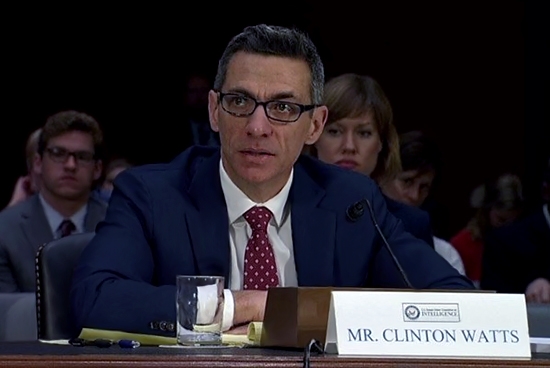Alumnus Clint Watts Testifies Before Senate Intelligence Committee

Looking into possible Russian efforts to influence the 2016 U.S. presidential election, the Senate Select Committee on Intelligence heard testimony on March 30 from Middlebury Institute alumnus and counterterrorism expert Clint Watts MAIPS ’05. A U.S. Army veteran whose resume includes service as an FBI special agent on a Joint Terrorism Task Force, and as the executive officer of the Combating Terrorism Center at West Point, Watts shared his extensive research into the Russian strategy to discredit the U.S. government and political process in the run up to the 2016 presidential election.
Watts, currently a senior fellow at the Foreign Policy Research Institute (FPRI), described in his written testimony how the modern Russian regime has in many respects taken the old Soviet Active Measure strategy and tactics and adapted them to the digital age. Asked by Senator James Lankford (R-OK) why these measures seemed to have been more successful in this election than before, Watts responded that “Part of the reason active measures have worked in this U.S. election is because the commander-in-chief has used Russian active measures at times against his opponents.”
According to Watts, he and his colleagues found odd activities in early 2014 connected with an online petition called “Alaska Back to Russia.” Their examination led them to believe that signings and postings on the petition were the work of automated bots closely tied with Russian propaganda. His written testimony explains:
Through the summer and fall of 2014, we studied these pro-Russia accounts and automated bots. Hackers proliferated the networks and could be spotted amongst recent data breaches and website defacements. Closely circling them were honeypot accounts, attractive looking women or passionate political partisans, which appeared to be befriending certain audience members through social engineering. Above all, we observed hecklers, synchronized trolling accounts that would attack political targets using similar talking points and follower patterns. These accounts, some of which overtly supported the Kremlin, promoted Russian foreign policy positions targeting key English speaking audiences throughout Europe and North America. From this pattern, we realized we were observing a deliberate, well organized, well resourced, well funded, wide ranging effort commanded by only one possible adversary – Russia.
Watts testified that the Kremlin continued to use this strategy to undermine the campaigns of both Democratic and Republican candidates considered less favorable to Russia. He added that Russia is continuing to employ this strategy in Europe and the U.S.
Watts’ testimony garnered a great deal of attention from news media outlets including CNN, BBC News, the Los Angeles Times, and the Washington Post.
For More Information
Jason Warburg
jwarburg@middlebury.edu
831.647.3156
Eva Gudbergsdottir
eva@middlebury.edu
831.647.6606
